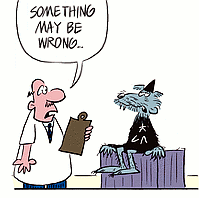What’s a logical paradox?
Preface
 This was written in 2009. (Revised 2022.) It explains the notion of a logical paradox in a way that comes naturally to me. The conclusion drawn at the end is probably the main thing for me (“We are blinder than we can imagine in matters of straightforward logical reasoning”) but it is not always emphasized by others!
This was written in 2009. (Revised 2022.) It explains the notion of a logical paradox in a way that comes naturally to me. The conclusion drawn at the end is probably the main thing for me (“We are blinder than we can imagine in matters of straightforward logical reasoning”) but it is not always emphasized by others!
 This was written in 2009. (Revised 2022.) It explains the notion of a logical paradox in a way that comes naturally to me. The conclusion drawn at the end is probably the main thing for me (“We are blinder than we can imagine in matters of straightforward logical reasoning”) but it is not always emphasized by others!
This was written in 2009. (Revised 2022.) It explains the notion of a logical paradox in a way that comes naturally to me. The conclusion drawn at the end is probably the main thing for me (“We are blinder than we can imagine in matters of straightforward logical reasoning”) but it is not always emphasized by others!
9. Newcomb’s paradox
Newcomb’s paradox is named after the American physicist William Newcomb, who discovered it in the 1960s. The paradox may take various forms but we only need a simple version here.
So imagine that a sealed box is placed before you, known to contain either a thousand dollars or a million, though you don’t know which.
The money in the box is yours to take (free money) but you are first required to make a certain decision. You must decide whether or not to say ‘Abracadabra’ before opening the box and taking the money.
Needless to say, saying ‘Abracadabra’ before opening the box would ordinarily be a silly thing to do, but the “catch” is that the man responsible for the contents of the box has made a prediction as to whether you would nevertheless say it. If he predicted that you would, then he has left a million dollars in the box, whereas if he predicted that you would not, then he has left only a thousand dollars in it.
His prediction was made yesterday and the contents of the box have long been settled and cannot now change. You don’t know what his prediction was and so don’t know if the box contains the thousand or the million. However, you have reason to believe that the man has correctly predicted whether or not you would say ‘Abracadabra.’ For example, he is an astute psychologist who is very good at predicting what people will do, with an impressive record of correct predictions to date.
If your sole concern is money, the more the better, should you say ‘Abracadabra’ before opening the box? Is there any point to doing so, relative (only) to the aim of enriching yourself?
Some people think that there is. For if you do, they venture, the man is likely to have predicted this and have left the million dollars in the box, whereas if you don’t, he is likely to have predicted that and have left only the thousand dollars in it.
After all, he is an astute psychologist who is very good at predicting what people will do, with an impressive record of correct predictions to date.
So saying ‘Abracadabra’ before opening the box is likely to make you a millionaire; you should therefore do so!
In contrast, others consider this to be absurd.
After all, whatever the track record of this predictor, the contents of the box were settled yesterday and cannot now change. Saying ‘Abracadabra,’ in particular, will certainly not cause them to change! Clearly, the contents of the box will remain what they are, whether you say ‘Abracadabra,’ wave your hands in the air, or do anything else of this sort.
So you cannot possibly gain anything by saying ‘Abracadabra.’ You should just open the box and take whatever it contains: a thousand dollars or a million, as the case may be. Saying ‘Abracadabra’ in the hope of finding more money in the box is just plain silly!
If you have never encountered this paradox before, consider pausing for a moment before reading on. In the scenario just described, is there any point to saying ‘Abracadabra’?
Notice that there are two opposing lines of reasoning here. Since they purport to establish opposite conclusions—one line concludes that you should say ‘Abracadabra’; the other that there is no point doing so—at least one of them must be mistaken, i.e., must contain some error of logic.
The trouble, however, is that each line of reasoning seems to be convincing in its own way. Both lines of reasoning appear to be correct, even upon close scrutiny! This may not be apparent at first glance because each line of reasoning may need a little time to sink in. But it’s reflected in the fact that both lines of reasoning have been championed by logicians and philosophers over the decades, who have accordingly divided themselves into two opposing camps. This also means that logicians and philosophers cannot agree on whether or not you should say ‘Abracadabra’ in the scenario described above; on whether or not there is any point in doing so. The result, after half a century, is deadlock. This logical impasse is what is known as Newcomb’s paradox. To appreciate it properly, we need to take a closer look at both of the lines of reasoning shown above. (I ran through them very quickly earlier.) As mentioned, one of them has to be erroneous, but each line of reasoning seems to be convincing in its own way! Let’s see why.
Let’s first reconsider the argument for saying ‘Abracadabra.’
This argument is meant to rest on your belief that the man is a good predictor; specifically, that he is likely to have correctly predicted whether or not you will say ‘Abracadabra.’ Now, if you believe this about the man, then you may reasonably expect—given how the money in the box depends on what the man has predicted—to find a million dollars in the box if you say ‘Abracadabra,’ but only a thousand dollars if you don’t. Accordingly, you should be compelled to say ‘Abracadabra.’
That’s the essential argument. Here are a couple of finer points.
Note that, while you are supposed to believe that the man is a good predictor, you need not regard him as being infallible. You may well admit a small chance that he has gotten his prediction wrong. (This actually makes things more realistic.) But so long as you believe that he is likely to have correctly predicted what you will do, you will consider it probable that there will be a million dollars in the box if you say ‘Abracadabra,’ and only a thousand dollars if you don’t. And this would be point enough to say ‘Abracadabra.’
As for why you should believe that the man is a good predictor, well, it’s essentially stipulated that you do. Sometimes, as above, a background story is told about the man’s “impressive track record”—e.g., hundreds of others have previously been in this situation, and most people who said ‘Abracadabra’ found that the man had predicted this; they subsequently found a million dollars in the box. Contrariwise, most people who declined to say ‘Abracadabra’ found that the man had predicted that; they accordingly found just a thousand dollars in the box. Now it’s your turn …
But this background story is incidental. So long as you accept that there could be a person with such remarkable predictive powers, then you should have no quarrel with the “stipulation” that you believe that such a man exists in the scenario in question. This stipulation would simply be one among the many stipulations already present in the scenario, e.g., that the box before you is sealed, or that what’s in the box depends on what the man predicted, or that your sole aim is money, and so on. It’s just stipulated that you believe that the man is likely to have correctly predicted whether or not you will say ‘Abracadabra.’ With this stipulation in place, you should automatically feel the pull of saying ‘Abracadabra.’
Of course, if you reject the stipulation outright, e.g., because you don’t believe that anyone could reliably predict what other people will do, then you won’t feel driven to say ‘Abracadabra.’ But you would then also be rejecting the entire scenario wholesale. You would be saying that the scenario is impossible to begin with because it contains an impossible feature, viz., that there exists this person who can accurately predict what other people will do. While this way of skirting the entire issue is available to anyone who wishes to take it, not many have in fact chosen to do so. It is generally agreed that there is no outright impossibility in there being such a good predictor as the one described, nor would it be absurd for you to believe that you were faced with one. And so the stipulation that you believe in the abilities of the predictor is generally allowed to pass without much ado. Many people accordingly find the argument in favour of saying ‘Abracadabra’ completely persuasive.
But now we come to the argument against saying ‘Abracadabra,’ i.e., for thinking that there is no point to saying it.
This argument appears to be just as persuasive. It rests on the fact that the money in the box has long been settled and cannot now change. (The man made his prediction yesterday and placed the money in the box then.) This being so, you can have nothing to gain from saying ‘Abracadabra.’ Suppose, for instance, that the man placed a thousand dollars in the box yesterday. Then, whatever you do now, you will only get a thousand dollars. Even if you say ‘Abracadabra,’ you will only get a thousand dollars. On the other hand, suppose that the man placed a million dollars in the box yesterday. Then, whatever you do now, you will get a million dollars. Even if you don’t say ‘Abracadabra,’ you will get a million dollars. Clearly, the amount you will get is determined by what the man placed in the box yesterday and not by whether you say ‘Abracadabra’ now. So there is no point whatsoever in saying ‘Abracadabra.’
That’s the essential argument. Many find it completely persuasive as it stands. But we can make it airtight by clarifying one last thing. We can make it clear that no backwards causation is going on, of the sort we saw in the previous section on logical fatalism.
Recall our example of retrospective prayer. A ship has sunk and the authorities have announced that there were only a few survivors. Can there be any point in praying to God now—after the fact—that your beloved was among the survivors? At first sight, no, since whether (or not) your beloved survived is something that has already happened:
In Newcomb’s scenario, however, no such thing is going on. While there is a sense in which the predictor can “see into the future,” this is just normal anticipation, and not divine foresight. There is no question of your saying ‘Abracadabra’ reaching back into the past and causing the man to predict that you would do so (thereafter to put a million dollars in the box)—as though he had a crystal ball that allowed him to see into the future. Rather, it is understood that the predictor makes his prediction in the normal way, simply by considering various facts about your personality, general temperament, and past behaviour in various contexts. He just “knows you well” in the way that a woman may know her husband well and be able to predict what he will think and do in various situations.
This clarification seals the case because now it really can make no difference whether or not you say ‘Abracadabra.’ By stipulation, nothing you do now has any causal influence on what the predictor has already placed in the box. So there really is no point in saying ‘Abracadabra’: you should just open the box and take whatever it already contains.
As mentioned, each of these two lines of reasoning is compelling in its own way, so much so that, after fifty years of vigorous debate, people cannot agree on which line of reasoning is the truly correct one.
Could it be that, in fact, both lines of reasoning are correct and that, accordingly, you both should and should not say ‘Abracadabra’?—that there both is and is not a point to doing so? Well, strictly speaking, this possibility exists in theory but, unsurprisingly, hardly anyone has suggested it as the way out of the difficulty. (It doesn’t seem to make any sense.) Everyone agrees, rather, that at least one of the two lines of reasoning above must somehow be erroneous, the only question being which one.
Notice, incidentally, that Newcomb’s paradox differs in structure from the paradoxes we have seen so far, which have all involved a single line of reasoning leading inexorably to an unbelievable conclusion. In Newcomb’s paradox, two different lines of reasoning lead inexorably to contradictory conclusions. In this latter case, something “unbelievable” is still present, of course, as was just noted above, namely, that these contradictory conclusions should both be true.
Needless to say, this structural difference is minor. The main thing is that logical reasoning has raised an “unbearable tension” that the rational mind is driven (but unable) to resolve. In Newcomb’s paradox, one side can “prove” that there is a point to saying ‘Abracadabra’ while the other side can “prove” that there is no point to it. At least one side must be reasoning in error since these conclusions can’t both be true. It seems simple enough but people cannot agree on which side has committed what error. The label ‘paradox’ is here deserved because of this impasse.
Some people are puzzled by this impasse because they consider it relatively obvious which side is correct! For example, many people consider it obvious that you should say ‘Abracadabra’ and are astonished that the other side is blind to the prowess of the predictor. Unfortunately, however, this astonishment cuts both ways. Equally many find it obvious that you should not say ‘Abracadabra’ and are flabbergasted that the other side fails to see that the money in the box is fixed and cannot change.
Indeed, the philosopher Robert Nozick, in his definitive introduction to this conundrum, warned us early on of such false confidence:
I have explored this fascinating paradox in greater detail elsewhere on this site.—See my essays on ‘Newcomb’s problem.’ For now, it suffices, as before, simply to notice how a piece of reasoning that is in fact erroneous can nevertheless seem utterly compelling when no “crazy conclusion” is there to warn us that something has gone wrong. Thus, neither the conclusion that you should say ‘Abracadabra,’ nor the conclusion that you should not, is intrinsically absurd. So the side above that has reasoned in error—whichever side this may be—is blissfully unaware that something has gone wrong.
To see how dangerous this can be, let’s suppose that it is in fact the argument for not saying ‘Abracadabra’ that is the fallacious one. (Just for illustration. With appropriate changes below, the opposite supposition would serve just as well.)
Consider now the following case.
Suppose that your doctor recommends that you take a medical test to see if you have a certain defective gene.
The gene is responsible for a terrible illness in later age, but if the symptoms haven’t surfaced yet, the condition has a chance of being treated. Indeed, many who take the test prove to have the gene, so the gene seems to be rather prevalent, and the test is always recommended.
But suppose that, unknown to medical science, there is a most peculiar correlation between deciding to take the test and testing positive for the gene. Something in the order of things—an unsuspected law of nature—makes it likely that, if you decide to take the test, then, amazingly, it will turn out, as shown by the test, that you do indeed have the gene; and vice versa, should you decline to take the test. Indeed, this is precisely why many who take the test prove to have the gene.
This may seem fanciful, since whether you have the gene was determined at the moment of conception, so how can your decision now to take the test have any bearing on whether or not you already have the gene?
But the situation is not essentially different from the case above, where if you decide now to say ‘Abracadabra,’ then, in all likelihood, a million dollars will prove yesterday to have been placed in the box; and vice versa, should you decline to say it. The only difference is that we have replaced the human predictor, responsible for placing money in the box, with an impersonal law of nature, responsible for laying down the gene.
You have no idea whether this law of nature really exists, but no one can rule it out either. Should you take the test and “risk” finding out that you have the defective gene?
Your doctor, who has never heard of Newcomb’s paradox, reasons calmly that you have nothing to fear from taking the test, since taking the test cannot cause you to have the gene. After all, whether you have the gene was determined at the moment of conception. (Similar to reasoning that you have nothing to gain from saying ‘Abracadabra’ since saying ‘Abracadabra’ cannot cause a million dollars to be in the box.)
To many people, this reasoning would be “completely convincing,” but the question is whether this is yet another alarming case of a subtle error of logic going undetected.
By now, we should have seen enough to know that, when it comes to a logical paradox, the simplest question may be the hardest one.
Newcomb’s paradox is named after the American physicist William Newcomb, who discovered it in the 1960s. The paradox may take various forms but we only need a simple version here.
So imagine that a sealed box is placed before you, known to contain either a thousand dollars or a million, though you don’t know which.
The money in the box is yours to take (free money) but you are first required to make a certain decision. You must decide whether or not to say ‘Abracadabra’ before opening the box and taking the money.
Needless to say, saying ‘Abracadabra’ before opening the box would ordinarily be a silly thing to do, but the “catch” is that the man responsible for the contents of the box has made a prediction as to whether you would nevertheless say it. If he predicted that you would, then he has left a million dollars in the box, whereas if he predicted that you would not, then he has left only a thousand dollars in it.
His prediction was made yesterday and the contents of the box have long been settled and cannot now change. You don’t know what his prediction was and so don’t know if the box contains the thousand or the million. However, you have reason to believe that the man has correctly predicted whether or not you would say ‘Abracadabra.’ For example, he is an astute psychologist who is very good at predicting what people will do, with an impressive record of correct predictions to date.
If your sole concern is money, the more the better, should you say ‘Abracadabra’ before opening the box? Is there any point to doing so, relative (only) to the aim of enriching yourself?
⚹
Some people think that there is. For if you do, they venture, the man is likely to have predicted this and have left the million dollars in the box, whereas if you don’t, he is likely to have predicted that and have left only the thousand dollars in it.
After all, he is an astute psychologist who is very good at predicting what people will do, with an impressive record of correct predictions to date.
So saying ‘Abracadabra’ before opening the box is likely to make you a millionaire; you should therefore do so!
In contrast, others consider this to be absurd.
After all, whatever the track record of this predictor, the contents of the box were settled yesterday and cannot now change. Saying ‘Abracadabra,’ in particular, will certainly not cause them to change! Clearly, the contents of the box will remain what they are, whether you say ‘Abracadabra,’ wave your hands in the air, or do anything else of this sort.
So you cannot possibly gain anything by saying ‘Abracadabra.’ You should just open the box and take whatever it contains: a thousand dollars or a million, as the case may be. Saying ‘Abracadabra’ in the hope of finding more money in the box is just plain silly!
If you have never encountered this paradox before, consider pausing for a moment before reading on. In the scenario just described, is there any point to saying ‘Abracadabra’?
⚹
Notice that there are two opposing lines of reasoning here. Since they purport to establish opposite conclusions—one line concludes that you should say ‘Abracadabra’; the other that there is no point doing so—at least one of them must be mistaken, i.e., must contain some error of logic.
The trouble, however, is that each line of reasoning seems to be convincing in its own way. Both lines of reasoning appear to be correct, even upon close scrutiny! This may not be apparent at first glance because each line of reasoning may need a little time to sink in. But it’s reflected in the fact that both lines of reasoning have been championed by logicians and philosophers over the decades, who have accordingly divided themselves into two opposing camps. This also means that logicians and philosophers cannot agree on whether or not you should say ‘Abracadabra’ in the scenario described above; on whether or not there is any point in doing so. The result, after half a century, is deadlock. This logical impasse is what is known as Newcomb’s paradox. To appreciate it properly, we need to take a closer look at both of the lines of reasoning shown above. (I ran through them very quickly earlier.) As mentioned, one of them has to be erroneous, but each line of reasoning seems to be convincing in its own way! Let’s see why.
Let’s first reconsider the argument for saying ‘Abracadabra.’
This argument is meant to rest on your belief that the man is a good predictor; specifically, that he is likely to have correctly predicted whether or not you will say ‘Abracadabra.’ Now, if you believe this about the man, then you may reasonably expect—given how the money in the box depends on what the man has predicted—to find a million dollars in the box if you say ‘Abracadabra,’ but only a thousand dollars if you don’t. Accordingly, you should be compelled to say ‘Abracadabra.’
That’s the essential argument. Here are a couple of finer points.
Note that, while you are supposed to believe that the man is a good predictor, you need not regard him as being infallible. You may well admit a small chance that he has gotten his prediction wrong. (This actually makes things more realistic.) But so long as you believe that he is likely to have correctly predicted what you will do, you will consider it probable that there will be a million dollars in the box if you say ‘Abracadabra,’ and only a thousand dollars if you don’t. And this would be point enough to say ‘Abracadabra.’
As for why you should believe that the man is a good predictor, well, it’s essentially stipulated that you do. Sometimes, as above, a background story is told about the man’s “impressive track record”—e.g., hundreds of others have previously been in this situation, and most people who said ‘Abracadabra’ found that the man had predicted this; they subsequently found a million dollars in the box. Contrariwise, most people who declined to say ‘Abracadabra’ found that the man had predicted that; they accordingly found just a thousand dollars in the box. Now it’s your turn …
But this background story is incidental. So long as you accept that there could be a person with such remarkable predictive powers, then you should have no quarrel with the “stipulation” that you believe that such a man exists in the scenario in question. This stipulation would simply be one among the many stipulations already present in the scenario, e.g., that the box before you is sealed, or that what’s in the box depends on what the man predicted, or that your sole aim is money, and so on. It’s just stipulated that you believe that the man is likely to have correctly predicted whether or not you will say ‘Abracadabra.’ With this stipulation in place, you should automatically feel the pull of saying ‘Abracadabra.’
Of course, if you reject the stipulation outright, e.g., because you don’t believe that anyone could reliably predict what other people will do, then you won’t feel driven to say ‘Abracadabra.’ But you would then also be rejecting the entire scenario wholesale. You would be saying that the scenario is impossible to begin with because it contains an impossible feature, viz., that there exists this person who can accurately predict what other people will do. While this way of skirting the entire issue is available to anyone who wishes to take it, not many have in fact chosen to do so. It is generally agreed that there is no outright impossibility in there being such a good predictor as the one described, nor would it be absurd for you to believe that you were faced with one. And so the stipulation that you believe in the abilities of the predictor is generally allowed to pass without much ado. Many people accordingly find the argument in favour of saying ‘Abracadabra’ completely persuasive.
⚹
But now we come to the argument against saying ‘Abracadabra,’ i.e., for thinking that there is no point to saying it.
This argument appears to be just as persuasive. It rests on the fact that the money in the box has long been settled and cannot now change. (The man made his prediction yesterday and placed the money in the box then.) This being so, you can have nothing to gain from saying ‘Abracadabra.’ Suppose, for instance, that the man placed a thousand dollars in the box yesterday. Then, whatever you do now, you will only get a thousand dollars. Even if you say ‘Abracadabra,’ you will only get a thousand dollars. On the other hand, suppose that the man placed a million dollars in the box yesterday. Then, whatever you do now, you will get a million dollars. Even if you don’t say ‘Abracadabra,’ you will get a million dollars. Clearly, the amount you will get is determined by what the man placed in the box yesterday and not by whether you say ‘Abracadabra’ now. So there is no point whatsoever in saying ‘Abracadabra.’
That’s the essential argument. Many find it completely persuasive as it stands. But we can make it airtight by clarifying one last thing. We can make it clear that no backwards causation is going on, of the sort we saw in the previous section on logical fatalism.
Recall our example of retrospective prayer. A ship has sunk and the authorities have announced that there were only a few survivors. Can there be any point in praying to God now—after the fact—that your beloved was among the survivors? At first sight, no, since whether (or not) your beloved survived is something that has already happened:
… if your beloved survived, prayer is unnecessary; whereas, if she didn’t survive, prayer will be ineffective …until we realize that, in this special context, backwards causation is a real possibility. Since God can literally see into the future, he may have foreseen your prayer at the time of the calamity and may have answered it in advance. In this case, your prayer reaches back into the past and causes God to act then. Amazingly then, as we saw, there is a point to praying, even though your beloved’s survival (or otherwise) is something that has already happened.
In Newcomb’s scenario, however, no such thing is going on. While there is a sense in which the predictor can “see into the future,” this is just normal anticipation, and not divine foresight. There is no question of your saying ‘Abracadabra’ reaching back into the past and causing the man to predict that you would do so (thereafter to put a million dollars in the box)—as though he had a crystal ball that allowed him to see into the future. Rather, it is understood that the predictor makes his prediction in the normal way, simply by considering various facts about your personality, general temperament, and past behaviour in various contexts. He just “knows you well” in the way that a woman may know her husband well and be able to predict what he will think and do in various situations.
This clarification seals the case because now it really can make no difference whether or not you say ‘Abracadabra.’ By stipulation, nothing you do now has any causal influence on what the predictor has already placed in the box. So there really is no point in saying ‘Abracadabra’: you should just open the box and take whatever it already contains.
⚹
As mentioned, each of these two lines of reasoning is compelling in its own way, so much so that, after fifty years of vigorous debate, people cannot agree on which line of reasoning is the truly correct one.
Could it be that, in fact, both lines of reasoning are correct and that, accordingly, you both should and should not say ‘Abracadabra’?—that there both is and is not a point to doing so? Well, strictly speaking, this possibility exists in theory but, unsurprisingly, hardly anyone has suggested it as the way out of the difficulty. (It doesn’t seem to make any sense.) Everyone agrees, rather, that at least one of the two lines of reasoning above must somehow be erroneous, the only question being which one.
Notice, incidentally, that Newcomb’s paradox differs in structure from the paradoxes we have seen so far, which have all involved a single line of reasoning leading inexorably to an unbelievable conclusion. In Newcomb’s paradox, two different lines of reasoning lead inexorably to contradictory conclusions. In this latter case, something “unbelievable” is still present, of course, as was just noted above, namely, that these contradictory conclusions should both be true.
Needless to say, this structural difference is minor. The main thing is that logical reasoning has raised an “unbearable tension” that the rational mind is driven (but unable) to resolve. In Newcomb’s paradox, one side can “prove” that there is a point to saying ‘Abracadabra’ while the other side can “prove” that there is no point to it. At least one side must be reasoning in error since these conclusions can’t both be true. It seems simple enough but people cannot agree on which side has committed what error. The label ‘paradox’ is here deserved because of this impasse.
Some people are puzzled by this impasse because they consider it relatively obvious which side is correct! For example, many people consider it obvious that you should say ‘Abracadabra’ and are astonished that the other side is blind to the prowess of the predictor. Unfortunately, however, this astonishment cuts both ways. Equally many find it obvious that you should not say ‘Abracadabra’ and are flabbergasted that the other side fails to see that the money in the box is fixed and cannot change.
Indeed, the philosopher Robert Nozick, in his definitive introduction to this conundrum, warned us early on of such false confidence:
I have put this problem to a large number of people, both friends and students in class. To almost everyone it is perfectly clear and obvious what should be done. The difficulty is that these people seem to divide almost evenly on the problem, with large numbers thinking that the opposing half is just being silly.More recently, and rather notably, the longstanding British newspaper The Guardian challenged its avid readers to resolve Newcomb’s paradox and discovered much the same, as did a subsequent rigorous PhilPapers poll of professional philosophers. Both of these polls used the standard version of the paradox, which is explained in the Guardian piece, unlike the simple version I have used above, but this difference is negligible. Half a century on, people continue to be split on this most contemporary of paradoxes.
⚹
I have explored this fascinating paradox in greater detail elsewhere on this site.—See my essays on ‘Newcomb’s problem.’ For now, it suffices, as before, simply to notice how a piece of reasoning that is in fact erroneous can nevertheless seem utterly compelling when no “crazy conclusion” is there to warn us that something has gone wrong. Thus, neither the conclusion that you should say ‘Abracadabra,’ nor the conclusion that you should not, is intrinsically absurd. So the side above that has reasoned in error—whichever side this may be—is blissfully unaware that something has gone wrong.
To see how dangerous this can be, let’s suppose that it is in fact the argument for not saying ‘Abracadabra’ that is the fallacious one. (Just for illustration. With appropriate changes below, the opposite supposition would serve just as well.)
Consider now the following case.
Suppose that your doctor recommends that you take a medical test to see if you have a certain defective gene.
The gene is responsible for a terrible illness in later age, but if the symptoms haven’t surfaced yet, the condition has a chance of being treated. Indeed, many who take the test prove to have the gene, so the gene seems to be rather prevalent, and the test is always recommended.
But suppose that, unknown to medical science, there is a most peculiar correlation between deciding to take the test and testing positive for the gene. Something in the order of things—an unsuspected law of nature—makes it likely that, if you decide to take the test, then, amazingly, it will turn out, as shown by the test, that you do indeed have the gene; and vice versa, should you decline to take the test. Indeed, this is precisely why many who take the test prove to have the gene.
This may seem fanciful, since whether you have the gene was determined at the moment of conception, so how can your decision now to take the test have any bearing on whether or not you already have the gene?
But the situation is not essentially different from the case above, where if you decide now to say ‘Abracadabra,’ then, in all likelihood, a million dollars will prove yesterday to have been placed in the box; and vice versa, should you decline to say it. The only difference is that we have replaced the human predictor, responsible for placing money in the box, with an impersonal law of nature, responsible for laying down the gene.
You have no idea whether this law of nature really exists, but no one can rule it out either. Should you take the test and “risk” finding out that you have the defective gene?
Your doctor, who has never heard of Newcomb’s paradox, reasons calmly that you have nothing to fear from taking the test, since taking the test cannot cause you to have the gene. After all, whether you have the gene was determined at the moment of conception. (Similar to reasoning that you have nothing to gain from saying ‘Abracadabra’ since saying ‘Abracadabra’ cannot cause a million dollars to be in the box.)
To many people, this reasoning would be “completely convincing,” but the question is whether this is yet another alarming case of a subtle error of logic going undetected.
By now, we should have seen enough to know that, when it comes to a logical paradox, the simplest question may be the hardest one.
Menu
 What’s a logical paradox?
What’s a logical paradox? Achilles & the tortoise
Achilles & the tortoise The surprise exam
The surprise exam Newcomb’s problem
Newcomb’s problem Newcomb’s problem (sassy version)
Newcomb’s problem (sassy version) Seeing and being
Seeing and being Logic test!
Logic test! Philosophers say the strangest things
Philosophers say the strangest things Favourite puzzles
Favourite puzzles Books on consciousness
Books on consciousness Philosophy videos
Philosophy videos Phinteresting
Phinteresting Philosopher biographies
Philosopher biographies Philosopher birthdays
Philosopher birthdays Draft
Draftbarang 2009-2024  wayback machine
wayback machine
 wayback machine
wayback machine










